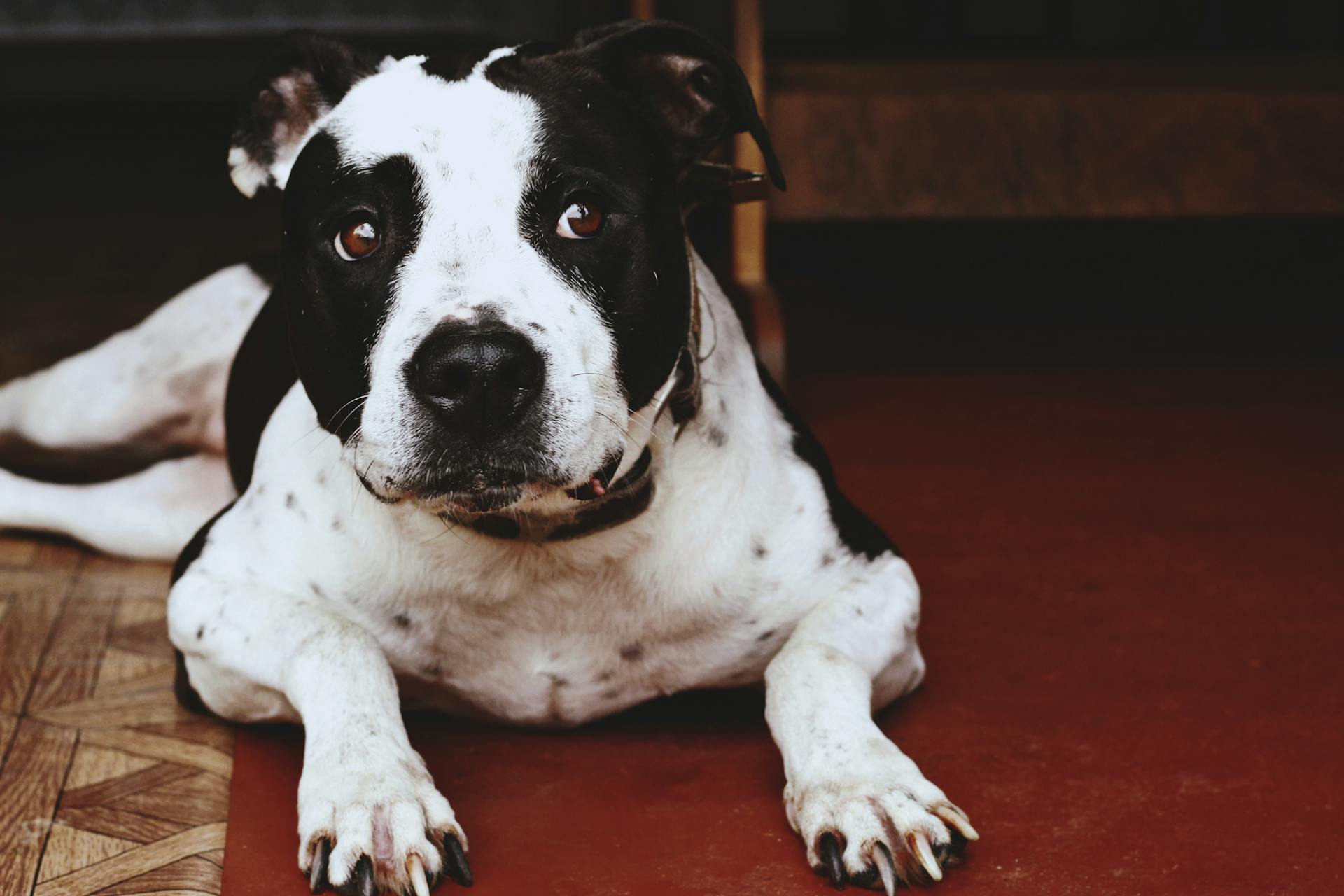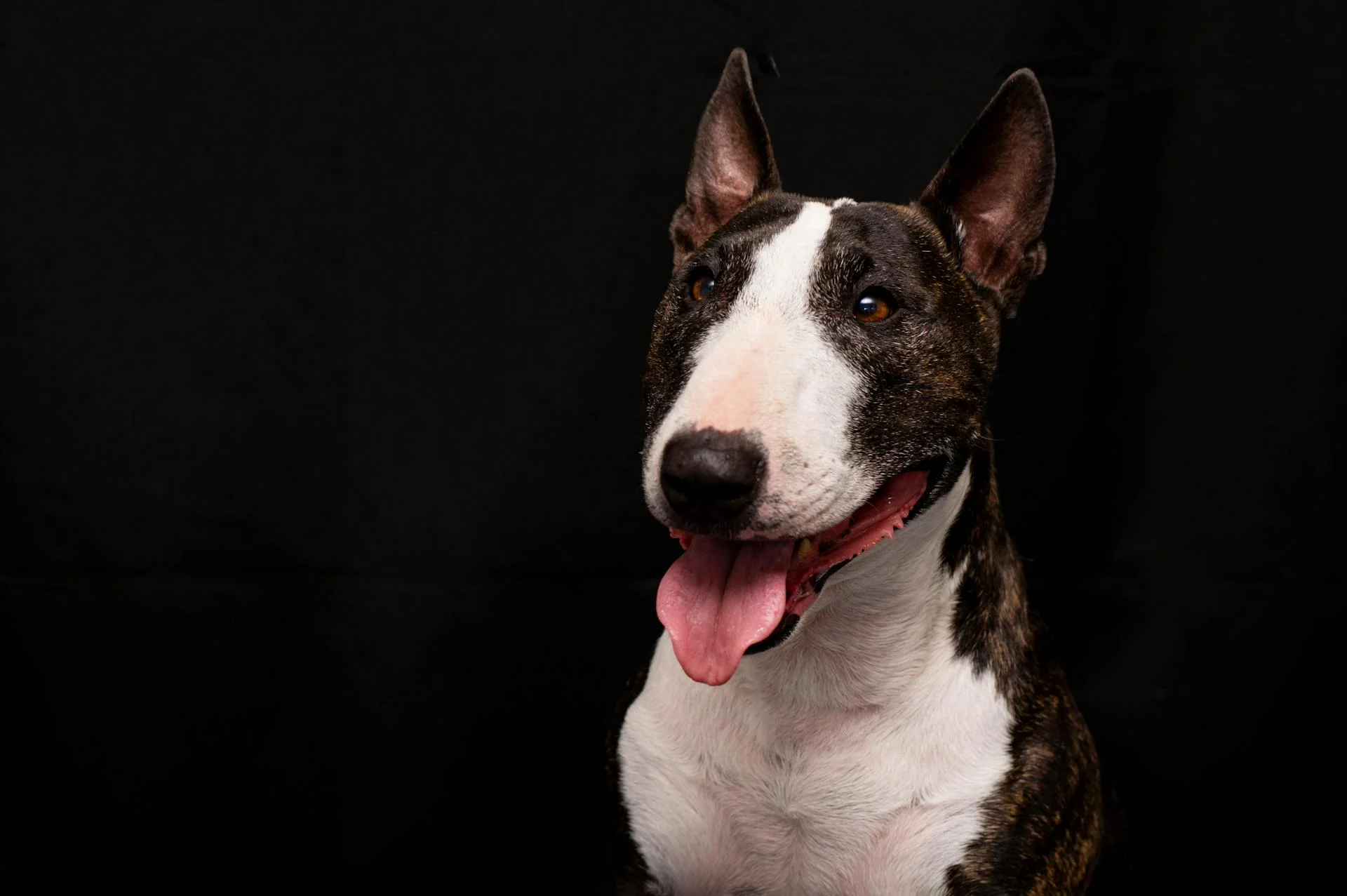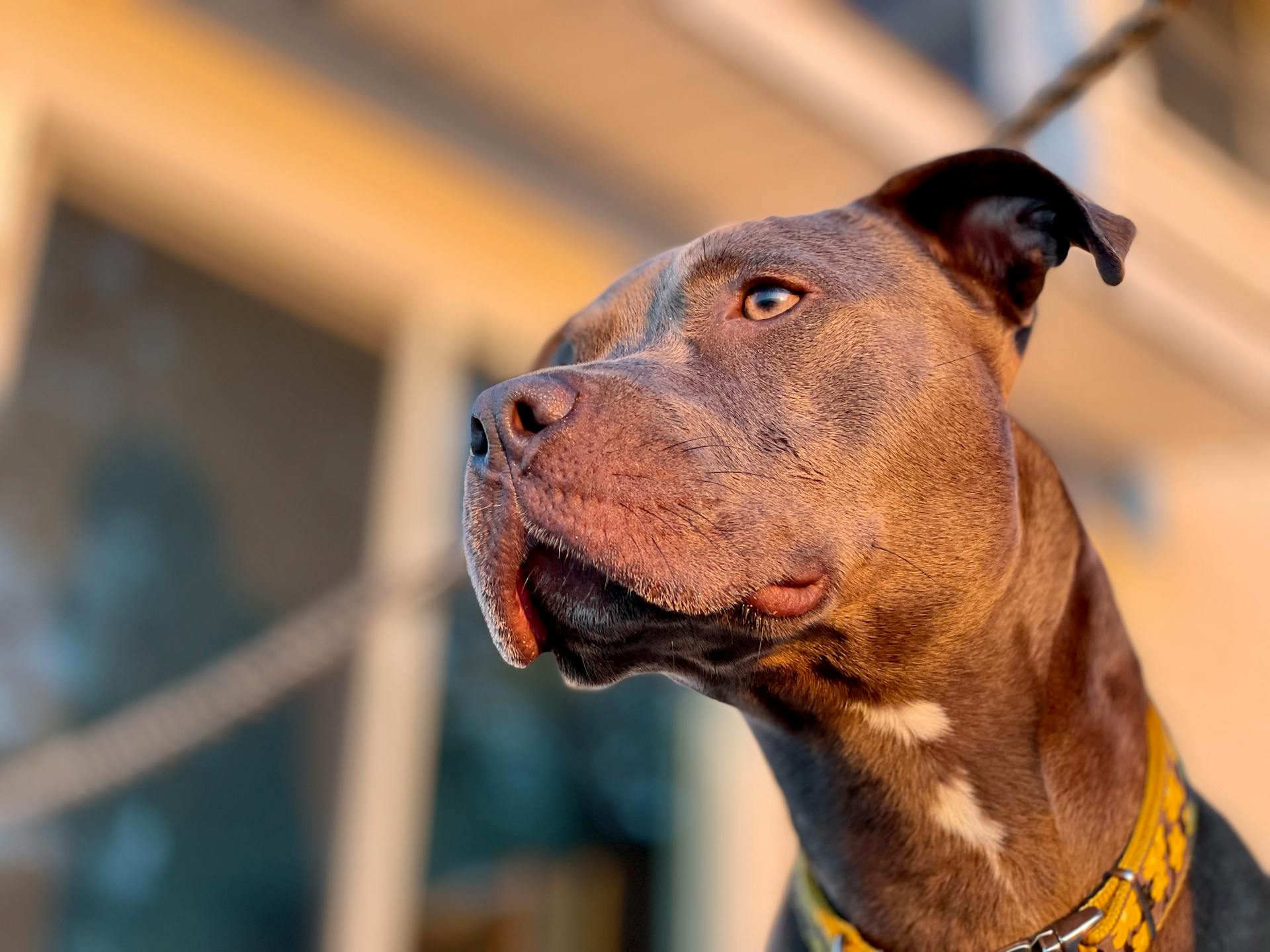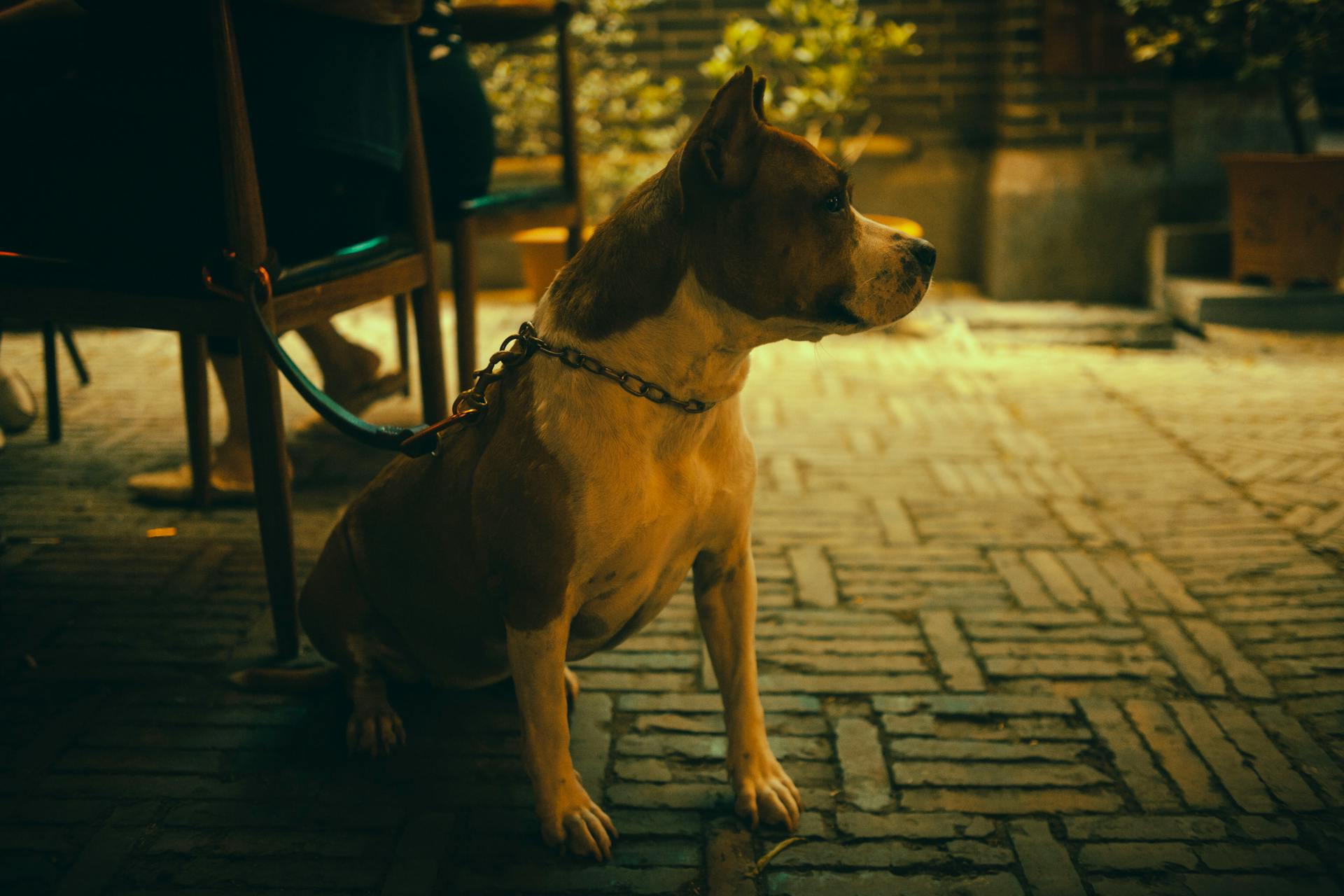
The Bull Terrier is a unique breed with a rich history. They were originally bred in England in the 19th century for bull-baiting, a blood sport that involved setting a dog on a tethered bull.
Their early purpose was to be a fierce and agile fighter. This is evident in their muscular build and athletic ability.
Bull Terriers are known for their distinctive egg-shaped head and short, easy-to-maintain coats. They come in a variety of colors, including fawn, white, and black.
Despite their tough beginnings, Bull Terriers are now beloved family pets, known for their affectionate and playful personalities.
Breed History
The Bull Terrier breed has a rich history that spans centuries. They were born in England in the 1800s through the crossing of the Bulldog and the Old English Terrier.
Their original purpose was for dog fighting, a popular bloodsport at the time. However, as the breed evolved, they became companions for English gentry.
The breed was later refined to make them more suitable as companions, with breeders focusing on a sweeter temperament and less rugged appearance. This process took several decades to complete.
Bull Terriers were initially bred for their strength and muscular build, but they were also known for their intelligence and trainability. They could be trained to protect themselves and their masters.
The breed's popularity soared in the 19th century, with many people keeping them as companions. They were even referred to as the "White Cavalier" due to their charm and elegance.
The breed's physical characteristics, such as their compact muscular frame and distinctive oval-shaped head, were developed over time through selective breeding.
If this caught your attention, see: Muscular Boston Terrier
Breed Characteristics
The Bull Terrier is a strong and muscular breed with a unique appearance. They have a stocky build, long front legs, and strong hind legs, which carry them in an agile and powerful gait.
Their head is long and strong, with a deep muzzle and a flat forehead that runs from ear to ear. They have small, thin ears and triangular-shaped eyes that give them a glinting, intelligent expression.
The Bull Terrier's temperament is friendly and comical, making them a great companion for many families. However, they don't always get along with other dogs, so it's essential to socialize them properly.
Here are some key characteristics of the Bull Terrier breed:
Coat
The Bull Terrier's coat is a standout feature of the breed. It's short and flat, growing directly against the body for a sleek look.
This coat has a tough feel and a glossy sheen, giving it a unique texture that's easy to spot. The coat comes in two main varieties: pure white and colored.
Colored coats can feature any color along with white markings, making each dog a one-of-a-kind. A white Bully may have markings on their head only, adding a touch of personality to their appearance.
The coat's texture and shine make it easy to maintain, requiring only occasional brushing to keep it looking its best.
Characteristics of the
The Bull Terrier is a breed that's full of personality. They're known for being friendly and comical, making them a great companion for many families.
Their friendly nature makes them get along well with people, but they can be a bit wary of other dogs. This is something to consider if you're thinking of bringing a Bull Terrier into a household with existing pets.
One of the most distinctive features of the Bull Terrier is their high energy level. They need plenty of exercise and playtime to keep them happy and healthy. If you're not prepared to provide regular physical activity, a Bull Terrier might not be the best fit for you.
Bull Terriers are also known for their love of play, which can sometimes get them into mischief. They're naturally curious and intelligent, but they can be a bit stubborn at times.
Here are some key characteristics of the Bull Terrier breed:
Overall, the Bull Terrier is a unique and lovable breed that's sure to capture your heart. With their playful, curious nature and high energy level, they're perfect for families who are looking for a lively companion.
Breed Temperament
Bull Terriers are naturally protective of their people, food, toys, and territory, making them excellent guard dogs. Their loud bark and muscular frame can be intimidating to potential intruders.
Early socialization is crucial to help Bull Terriers understand that aggressive behavior is unacceptable. This means spending time with people, other dogs, and small animals early in life.
Bull Terriers have a tendency to resource guard, defending their dog bowl or feeder, so early training is essential to prevent this behavior. If not trained, they may drag you around on walks.
With proper training, Bull Terriers can be sweet-natured and silly, showcasing their wonderful qualities. However, if they feel threatened, their aggressive side will come out.
Consider reading: Bull Terrier Aggressive Behavior
Caring for a
Caring for a Bull Terrier requires interaction with people, as they thrive on being part of the family. They're easy to engage in exercise and happy to greet each new day.
Bull Terriers are a member of the terrier group, so they have a certain amount of energy and independent thinking. They need physical and mental stimulation.
Providing consistent positive reinforcement training is key to ensuring your Bull Terrier grows into a well-mannered family member. Early socialization and obedience training can make a big difference.
As a breed that thrives on interaction, Bull Terriers need to be part of the family to be happy.
Breed Adoption

Bull terrier adoption is a great way to give a loving home to a dog in need. If you're looking to adopt a bull terrier, be sure to check local animal shelters and rescue groups for a dog in need of a home.
You can find a bull terrier in need of a home at a relatively low cost. In fact, adopting a dog from a shelter can be a much more affordable option than buying from a breeder.
Bull terriers are a fairly popular dog breed, so you may be able to find one at your local animal shelter. Expect to find a variety of ages and personalities, but all with that signature bull terrier charm.
Adopting a bull terrier from a shelter can be a very rewarding experience, and it's a great way to give a loving home to a dog in need.
Broaden your view: Water Loving Dogs for Short Nyt
Breed Personality
The Bull Terrier is a playful and clownish breed that's often compared to a 3-year-old child in a dog suit. They're full of energy and love to have fun.
Bull Terriers are generally loving and affectionate, but they have a bit of a reputation for being attention-seekers. They'll happily climb onto the lap of the next person offering a treat and a cuddle.
One minute they're showering you with affection, the next they're feeling independent and want nothing to do with you. It's not uncommon for them to display all of these traits within the span of a few minutes.
Early and frequent socialization and training is key for Bull Terriers, especially when it comes to interacting with other pets. They're not always dog- or cat-friendly, so it's essential to supervise their interactions with small children and other animals.
With proper training and socialization, Bull Terriers make wonderful family pets, including for families with children. They're loyal and loving, but they do require a lot of attention and exercise to keep them happy and healthy.
Explore further: Can Pit Bulls Make Good Pets
Training
Training is essential to manage your bull terrier, and it's crucial to start them young to prevent bad habits from forming.
Bull terriers can be stubborn, but they're highly intelligent, making positive reinforcement methods a must.
Training sessions should feel like a game rather than work to get the best results.
Socialization is also vital, and aim to expose your dog to different people and other dogs from a young age.
Positive experiences can go a long way in ensuring your bull terrier is well-mannered, but some may have a difficult time being comfortable around other dogs, especially unfamiliar ones.
Breed Information
The Bull Terrier is a strong, stocky and muscular breed.
Their body is slightly longer than it is tall, with moderately long front legs and hind legs that are characterized by strong, muscular thighs.
Their round, compact and catlike feet may seem a bit out of place on such a stocky and muscular animal, but they carry this dog in an agile and powerful gait.
The breed sports a head that strongly resembles a football, having a long and strong head with a deep muzzle and a flat forehead that runs from ear to ear.
Suggestion: Bull Terrier Head Shape
Their small, thin ears are close together at the top of the head and give this breed a distinctive appearance.
The Bull Terrier's triangular shaped eyes are sunken, small and dark, and give this pup a glinting, intelligent expression.
The breed's neck is tapered from head to shoulders and is long and strong.
The Bull Terrier's tail is short, set low and is generally carried in the horizontal position, thick at the base and tapering to a point.
The modern Bull Terrier descended from a cross between the Bulldog and the White English Terrier and was bred for dog fighting in the 19th century.
The breed's coat is short and flat, has a glossy sheen but is coarse to the touch and comes in white and colors.
The addition of new blood by Birmingham breeder James Hinks helped stabilize the breed's type.
Deafness in all-white Bull Terriers became a problem, but the introduction of colored Bull Terriers in the 1920s helped alleviate this issue.
Expand your knowledge: Small White Fluffy Dog Types
Frequently Asked Questions
What is the purpose of terrier?
Terriers were originally bred to control pests and rodents in barns and stables, making them useful working dogs. Their purpose is to be a valuable asset in managing unwanted vermin and critters.
What two dogs make a Bull Terrier?
A Bull Terrier is a cross between the old English terrier and the bulldog. This initial mix was later refined with other breeds, including the Spanish Pointer.
Featured Images: pexels.com


